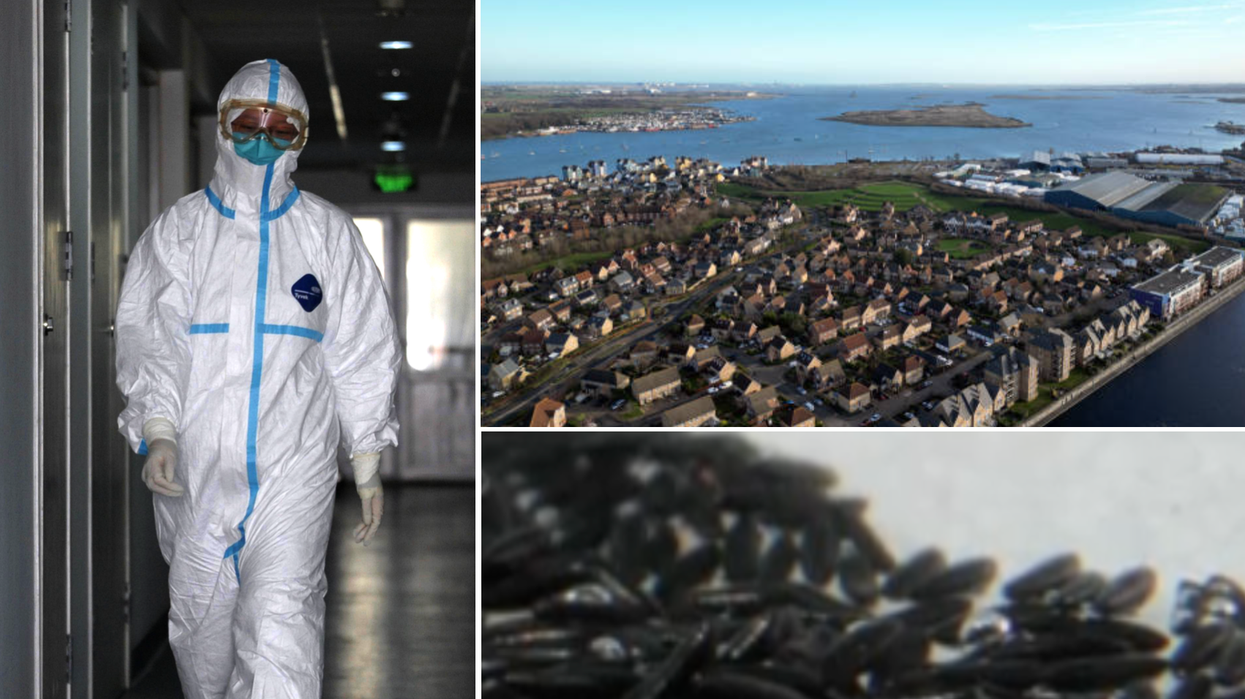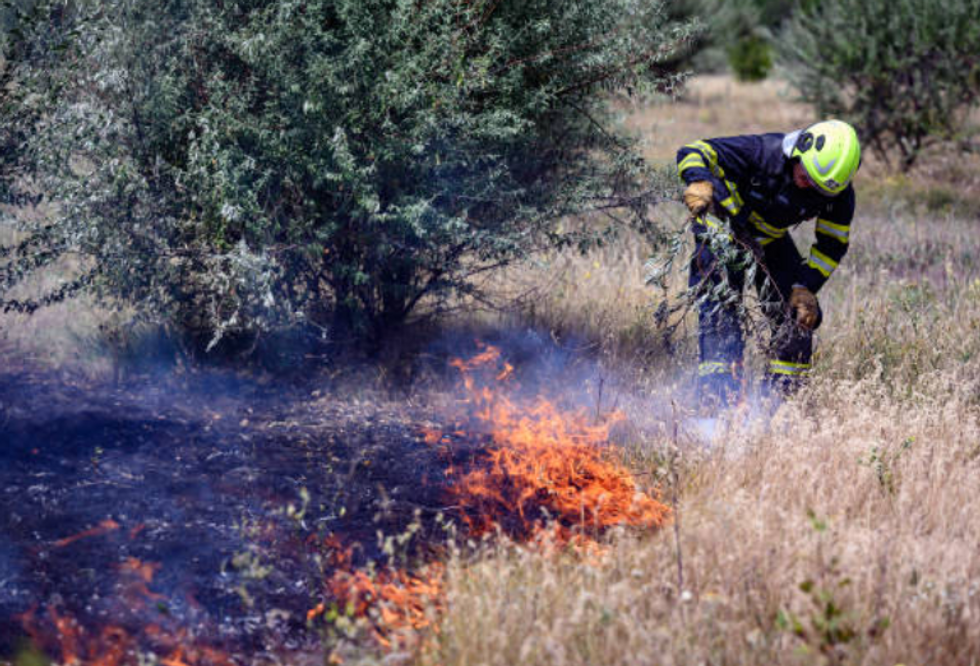Eggs of a mosquito known to cause 'bone-breaking' disease and death found in England sparking health warning

Dengue fever was historically confined to tropical and subtropical environments but the eggs have started hatched in UK
|Getty Images

For centuries, dengue fever was confined to tropical and subtropical regions - this is no longer the case. Our Health Editor investigates.
Don't Miss
Most Read
Latest
An epidemiologist is sounding the alarm after eggs of a mosquito known to transmit a deadly disease were found in England.
Dengue fever is commonly referred to as the 'bone-breaking' disease as the viral infection may cause severe muscle and joint pain, and in some cases can result in internal bleeding and death.
It is primarily spread through the bite of an infected Aedes aegypti mosquito, which is found in tropical and subtropical environments.
Approximately 75 per cent of the global prevalence for dengue infections is in Southeast Asia and the Western Pacific regions.
Since the turn of the millennium, however, dengue fever has expanded its reach and become more widespread in countries where it's endemic.
According to the World Health Organization (WHO), reported cases surged tenfold from 2000 to 2019, escalating from 0.5 million to 5.2 million cases.
Since 2023, sustained transmission of dengue, coupled with an unexpected upsurge in cases, has led to more than five million infections reported across more than 80 countries/territories, which included more than 5000 dengue-related deaths.
It has spread to southern Europe via the Asian tiger mosquito - a small, black and white mosquito that bites during the day.
Also known as Aedes albopictus, the tiger mosquito was first imported to the continent via global trade and travel, and warmer climates have allowed its eggs to survive there, explains Professor Mathew Bayliss, Oxenhale Chair of Veterinary Epidemiology at the University of Liverpool.
To date, it's been found in 13 European countries but its presence in France is most concerning given the country's proximity to Britain, the professor tells GB News.
Since it was first detected in 2004, the mosquito has spread to 71 of France's 96 mainland départements, including areas near the Channel coast.
In 2022, France had 66 localised cases of dengue fever, which is the same number as the previous ten years combined.
A year later, mosquito control measures were implemented in Paris for the first time to kill the disease-carrying tiger mosquitoes.
Despite this effort, a record number of imported cases of dengue fever have been recorded in France in 2024.

Mosquito control measures were implemented in Paris in 2023 to kill the disease-carrying tiger mosquitoes
|Getty Images
The tiger mosquito is now "doing its utmost" to survive in the UK, warns Professor Bayliss, adding that the invasive species has been detected several times in the South East of England.
A small number of eggs were found in a Kent location near the motorway system in 2016. This was the first time the species was detected in the UK.
A year later, larvae were discovered in Kent through a Public Health England (PHE) monitoring project.
In 2019, tiger mosquitoes were found at various sites in Kent and London.
"It seems to travel across the channel in lorries or cars. Mosquitos flying into vehicles and then escaping when that vehicle stops in a service station," explained Prof Bayliss.
This is not an immediate cause for concern, he says, noting that there's no evidence that this mosquito can currently "survive or thrive" in the UK. He has warned, however, that if it gets to London, where it is warmer, it could establish itself and climate change modelling predicts temperatures will continue to rise.
This assessment strikes Doctor Ilaria Dorigatti, a Reader in Infectious Disease Analysis and Modelling at Imperial College London, as overly pessimistic.
Firstly, it hasn't been "strictly demonstrated" that the upswing in dengue cases can be ascribed to climate change, she tells GB News, although she concedes modelling suggests it's likely contributing.
Secondly, cars driven from France through the UK are closely monitored and there is no evidence that the mosquito population has been effectively established, Doctor Dorigatti says.
The third and most crucial point is that the tiger mosquito cannot survive the winter so the UK does not provide the optimal conditions to "sustain dengue transmission" at the moment, she says.
The infectious disease expert acknowledges that you can expect people will travel to an endemic country from the UK, get the infection there and return. Still, the UK isn't home to populations of mosquitoes that "transmit dengue to sustain an epidemic".
The UK Health Security Agency (UKHSA) has made similar noises, noting says there is a "very low" probability of getting infected with dengue in the UK, given the absence of "established evidence" for "competent mosquito vector populations" in the UK required for dengue transmission.
However, a breakthrough new study led by the UK Centre for Ecology & Hydrology (UKCEH) warns this is likely to change in the future as the UK feels the effects of climate change.
Previous disease risk predictions indicated large regions, such as the whole of southern Europe, had a similar risk of local dengue cases over long timeframes, leaving local authorities uncertain whether their area was likely to be affected and whether action to prevent outbreaks was necessary.
But the UKCEH-led advanced high-resolution modelling divides Europe as well as eastern Asia and North America into 10km squares, providing daily risk assessments for each area.
The new research involves a more detailed study of the entire life cycle of a mosquito, examining the impact of local climate and competition for food on species traits such as how long it lives and the number of eggs it lays.
This provides more accurate assessments of where, when and for how long there are likely to be local dengue cases.
Doctor Dominic Brass, an epidemiological modeller at UKCEH, who led the study, published in Nature Communications, said: "We predict that the parts of Europe most affected by dengue fever will continue to be southern France and northern Italy, due to a favourable climate, a stable mosquito population and the high number of travellers returning from tropical countries where the disease is prevalent.
"However, areas of risk are expanding northwards. Our ongoing research is modelling of the likely extent of future outbreaks in Europe under future climate change."
For areas without established mosquito populations, such as Britain, it is useful to know what the disease risk would be if the species did arrive.
As the UKCEH researchers explain, this change can happen fairly quickly; Paris, for example, went from the first detection of the tiger mosquito in 2015 to having a dengue outbreak last year.
They acknowledge that the species has not yet become established in the UK despite eggs having been found in south-east England.
But a warmer climate in northern hemisphere countries means the mosquitoes' eggs are more likely to survive, thereby increasing populations, and hotter temperatures cause viruses to replicate faster, the researchers warn.
Given the northward expansion of dengue of the tiger mosquito, scientists expect this invasive species to eventually gain a foothold in the UK.
LATEST HEALTH DEVELOPMENTS

Climate in northern hemisphere countries means the mosquitoes' eggs are more likely to survive
|Getty Images
How to respond
Preventive measures are the best strategy for controlling dengue.
Professor Bayliss of the University of Liverpool recommends health officials try and stop the mosquito entering the UK through the Channel Tunnel by spraying vehicles with insecticide.
"That's something worth looking at in terms of practicality and cost as it could buy us some time," he told GB News. It's also worth learning from and adapting the measures currently being taken on the continent, the prof adds.
In Northern Europe, the focus is on preventing further expansion of Asian tiger mosquitoes through surveillance, particularly around container ports and other major goods corridors.
Other measures include fumigation of potential mosquito breeding sites, open spaces and infected people's homes.
More broadly, scientists are deploying ambitious and experimental methods to control dengue.
According to Doctor Dorigatti, the sterile insect technique (SIT) has proven an effective method for controlling dengue-transmitting mosquitoes.
SIT involves releasing large numbers of sterilised male mosquitoes into the wild to compete with and mate with wild females.
Because the sterilised males do not produce offspring, the insect population declines over time.
SIT has been used to control dengue in several countries, including Tahiti.
One study in Ortigueira, Brazil, found that releasing 59 million sterile male mosquitoes over 20 months reduced dengue cases by almost 95 per cent.
Another novel approach to controlling the spread of dengue is to infect mosquitoes with Wolbachia, explains Doctor Dorigatti.
Wolbachia is a bacterium that prevents the dengue virus from replicating in the bodies of tiger mosquitoes. Wolbachia also reduces the ability of mosquitoes to survive and mate.
This has proven to be a highly effective intervention. Introducing mosquitoes infected with the Wolbachia bacteria to parts of an Indonesian city reduced the incidence of dengue by 77 per cent and cases of the disease requiring treatment in hospital by 86 per cent, according to a study published in the New England Journal of Medicine.
Last year, the UK Medicines and Healthcare products Regulatory Agency (MHRA) approved Takeda's Qdenga vaccine for people aged four and older.
The vaccine is licensed for active immunisation against dengue infection but WHO recommends using the vaccine in areas with a high burden of dengue.
The vaccine is about 81 per cent effective against all types of dengue virus after the first dose, and about 95 per cent effective after the second dose.
However, a study published in The Lancet found some waning efficacy over the course of three years after vaccination.
Another cause for concern, which is why the vaccine is better suited to highly transmissible settings than the UK, is the risk of antibody-dependent enhancement (ADE).
As Doctor Dorigatti explains, ADE is a phenomenon where antibodies, instead of protecting you from a virus, actually help the virus to infect your cells more effectively.
When you get infected with a virus or receive a vaccine, your body produces antibodies. These antibodies usually recognise the virus and either neutralise it directly or mark it for destruction by your immune system.
The twist with ADE is that sometimes these antibodies don't neutralise the virus completely.
Instead, they bind to the virus in a way that allows it to enter certain types of immune cells more easily. These antibodies act like a "Trojan horse", helping the virus to sneak into cells that it wouldn't normally infect so efficiently.
Once inside these cells, the virus can replicate more, leading to a more severe infection than if the antibodies weren't there at all.
This happens because the virus uses the antibodies to get into cells that have receptors designed to grab onto antibodies.
ADE has been observed in some viral infections and is a concern in vaccine development because vaccines aim to produce protective antibodies.
If these antibodies lead to ADE, instead of preventing disease, they could make a subsequent infection worse.
This has been seen with viruses like dengue, where getting infected with one type of dengue virus can lead to more severe disease if you're later infected with another type due to cross-reactive antibodies that enhance the virus's entry into cells.
Natural infection typically results in the production of a broad spectrum of antibodies against various parts of the virus, not just the spike protein (the key part of the surface of the virus that allows it to gain entry into cells).
This diverse antibody response can neutralise the virus more effectively and might reduce the likelihood of ADE.
This is why the vaccine is more suitable in high transmission settings because there you have greater levels of natural infection, thereby reducing the risk of ADE through vaccination, explains Doctor Dorigatti.
In Prof Bayliss' estimation, all these efforts will be in vain if governments do not tackle globalisation and climate change.
"Through travel and trade we are spreading things at a rate that's never been seen before," he told your correspondent.
However, the prof is inclined to think competing interests will continue to fuel the spread of dengue for decades to come.
"Climate change is making it easier for vector-borne diseases to thrive but clamping down on travel and trade would be a significant curtailing of our personal freedoms so I don't know that anyone's really got the stomach for that."










